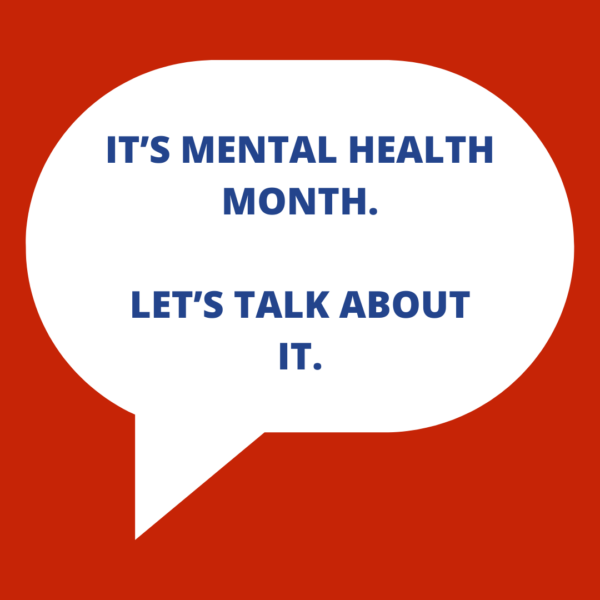Mental Health Month:
Let’s Talk About It
October is Mental Health Month, an important time to focus on the well-being of ourselves and those around us. This year’s theme, Let’s Talk About It, emphasises the power of conversation in breaking down the stigma surrounding mental health. It’s a reminder that talking about mental health isn’t a sign of weakness, but a crucial step toward healing and support.
How to Talk About It
If you’re the one facing mental health challenges, talking about it may feel intimidating, but it can be incredibly freeing. Here are some ways to approach the conversation:
- Find someone you trust: It could be a close friend, family member, or a professional. The key is to choose someone you feel safe and comfortable with.
- Be as open as you can: People often want to help but might not know how unless you’re honest about what’s going on for you. Share what feels right, even if it’s hard to say everything at once.
- Remember you’re not a burden: Others want to hear from you because they care. Mental health struggles are not something you should bear alone.
How to Be a Mental Health Ally
Whether you’re supporting a loved one or being an advocate in your community, here are some ways to show up as a mental health ally:
- Listen Actively Without Judgment
When someone opens up to you about their struggles, give them your full attention. Avoid jumping in with advice right away—just listen.
- Educate Yourself About Mental Health Issues
Understanding mental health conditions can help you respond with more compassion and effectiveness. Read articles, attend workshops, or watch educational videos to deepen your knowledge.
- Offer Support
Ask what kind of help they need, rather than assuming. Support can come in many forms—sometimes it’s a hug, a distraction, or simply sitting in silence together.
- Respect Boundaries
Every individual’s comfort level varies, and it’s essential to respect their wishes. Some may not want to talk in detail, while others might need more time and space to process.
- Encourage Professional Help
If someone is struggling, gently suggest they seek professional support from a counsellor, therapist, or doctor. There’s no shame in needing help—just as we go to doctors for our physical health, we should seek mental health professionals for emotional support.
When to Talk About It
There’s no wrong time to start the conversation. Whether it’s during a stressful period or even when you’re feeling well, keeping mental health conversations ongoing can normalise the experience and break down stigma.
Who to Talk To
It doesn’t have to be a close friend or family member. In fact, some people find it easier to open up to someone they don’t know personally, like a trained counsellor or mental health professional. What matters is that you talk to someone who will listen and support you.
Mental Health Resources
If you or someone you know is struggling with mental health, there are many resources available in Australia:
- Lifeline Australia: Call 13 11 14 or visit lifeline.org.au for 24/7 crisis support.
- Beyond Blue: Call 1300 22 4636 or visit beyondblue.org.au for support with anxiety, depression, and suicide prevention.
- Kids Helpline: Call 1800 55 1800 or visit kidshelpline.com.au for free, confidential counselling for young people aged 5 to 25.
- Headspace: Visit headspace.org.au for support specifically for young people aged 12-25 and their mental health.
- SANE Australia: Visit sane.org or call 1800 187 263 for support, information, and resources related to complex mental health issues.
- If you are a Legacy client and need support, connect with your local club who can refer you to the right person/pathway.
This October, let’s all commit to being more open, more compassionate, and more willing to talk about mental health. Together, we can make a difference.
Article written by Demetra Proestos (Legacy Club Services).

